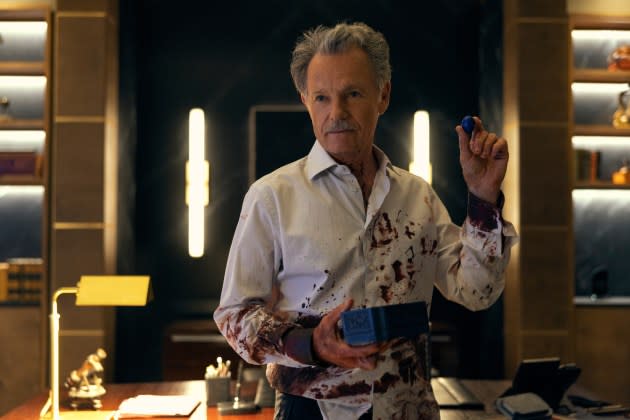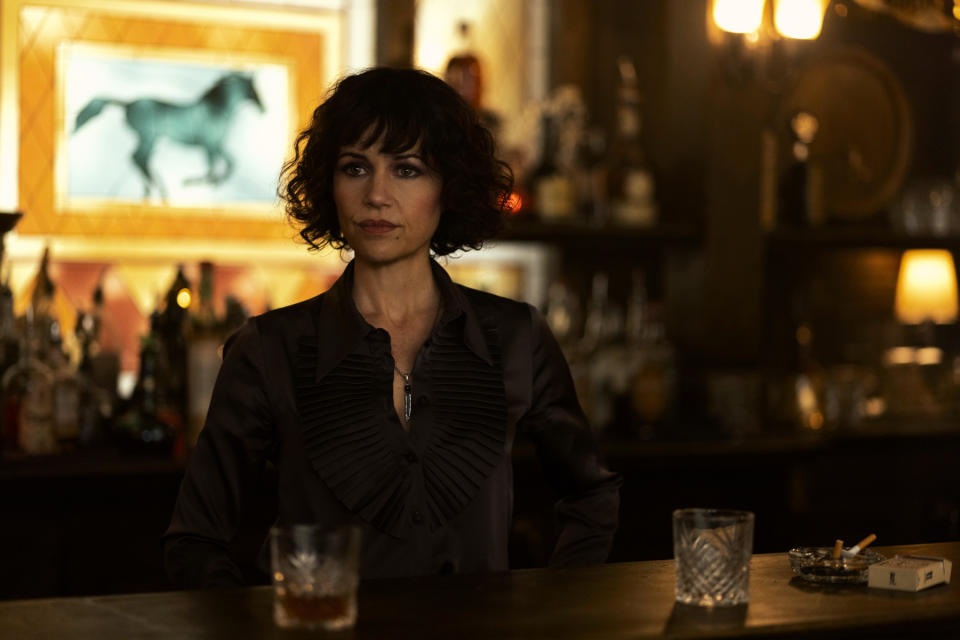‘The Fall of the House of Usher’ Is a Literary Orgy of Death

In many ways, Mike Flanagan is the perfect creator for the current era of Netflix. The streaming giant has moved in recent years to making fewer seasons per series, and frequently canceling shows before they’ve finished telling their respective stories. Flanagan technically doesn’t make an ongoing series, but rather writes and directs various miniseries that tend to feature a lot of the same actors, like Carla Gugino, Henry Thomas, Rahul Kohli, and his wife Kate Siegel. The different projects — including The Haunting of Hill House, The Haunting of Bly Manor, and Midnight Mass — aren’t always tonally identical, but all fit somewhere along the horror spectrum. And collectively, they feel like part of a larger anthology drama, like a more literary, less aggro version of American Horror Story. In structuring his projects this way, Flanagan gets to keep telling stories season after season without having to worry about Netflix shutting him down, or even for any one particular idea to overstay its welcome. It’s a fiendishly clever workaround.
His latest show, The Fall of the House of Usher, brings back many of the familiar players, and revisits many of Flanagan’s pet themes about dysfunctional families and the way we’re all haunted by our pasts. It’s excellent in many ways, and fairly engrossing throughout. But in one notable way, it’s the first Flanagan project to not feel entirely at home on Netflix, because it would likely play much better as a weekly series than as a binge.
More from Rolling Stone
Robbie Williams Looks Back at Tumultuous Career in New Docuseries Trailer
Last Chance for Prime Day Streaming Deals: Get 99-Cent Channels and 50% Off Popular Movie Titles
Like The Haunting of Bly Manor, the new show is a mash-up of the works of a particular author — in this case, Edgar Allan Poe. The framing device roughly follows the titular short story plot, as wealthy Roderick Usher (Bruce Greenwood) tells prosecutor C. Auguste Dupin (Carl Lumbly) the story of how his family came to ruin. But there are Poe works incorporated throughout, like a younger Roderick (played in flashback by Zach Gilford) writing the poem “Annabel Lee” as a tribute to his first wife (Katie Parker), or episodes getting familiar Poe-ish titles like “The Masque of the Red Death” and “The Pit and the Pendulum.” If you have only a casual history with Poe, or don’t know his work at all, the story still works on its own terms. It’s just a bonus if you understand the importance of ravens, or why Roderick and his sister Madeline (Mary McDonnell) will at times stare meaningfully at a basement’s brick wall. And some references are just Easter eggs, like Dupin being named after a recurring Poe character who is widely considered the protagonist of the earliest fictional detective stories.

The show has a large ensemble in both the past and the present, as we see how all six of Roderick’s children — failson Frederick (Thomas), influencer Tamerlane (Samantha Sloyan), medical researcher Victorine (T’Nia Miller), video game magnate Napoleon (Kohli), crisis PR expert Camille (Kate Siegel), and wannabe club owner Prospero (Sauriyan Sapkota) — each comes to a grisly end over a period of days while Dupin is attempting to convict Roderick for running a pharmaceutical company that’s contributed mightily to the opioid epidemic. And as the siblings(*) die one by one, Roderick and Madeline keep seeing Verna (Gugino), the bartender they met at a fateful moment in their lives decades earlier, who has not aged a day.
(*) The elaborate names all hearken back to Poe’s day, but most of them prefer simpler and more modern nicknames: Leo rather than Napoleon, Perry rather than Prospero, etc.
So Flanagan is taking on a lot here, combining his Poe greatest hits mix with elements of both Succession and Dopesick. It might be too much to keep a firm narrative grip on, if not for that framing device. Greenwood and Lumbly have each been in Flanagan films (both appeared in Doctor Sleep, and Greenwood was Gugino’s husband in Gerald’s Game), but this is their debut in the Mike Flanagan Expanded Television Universe. Both are veteran actors who have largely played variations on the same role — Greenwood as a smug jerk who gets away with everything, Lumbly as a righteously indignant crusader — going all the way back to their early supporting roles on Eighties procedural dramas (St. Elsewhere for Greenwood, Cagney & Lacey for Lumbly). Together, they bring so much charisma and gravity to the story that everything feels unified, no matter how many tangents Flanagan chooses to go on. They’re compelling enough that the show might work if it was just these two old men talking in the living room of a seemingly haunted house, with Roderick describing everything that’s happened.
The rest of the cast isn’t too shabby, either. The great McDonnell doesn’t get as much to do as you might hope, but more than anyone she embodies the cold ruthlessness that has brought the Usher family to such great heights, and set them up for such an awful fate(*). Mark Hamill, opting for a deep gravelly voice, offers some welcome dark comedy as family fixer Arthur Pym, of whom Dupin suggests, he’s the kind of man you call if you’ve accidentally killed a prostitute and need to dismember the corpse. (Roderick: “No, he’s not nearly that boring.”) Each of the middle chapters largely focuses on the Usher sibling who is about to die, and Siegel, Kohli, Miller, and the others all ably carry those hours.
(*) Late in the series, Madeline delivers a monologue that’s Flanagan’s ambitious attempt to offer a sweeping commentary on late-stage capitalism, modern politics, and the fragile state of our world. On paper, it seems far too ambitious, but McDonnell absolutely kills it.
The individual deaths are unflinchingly graphic in different ways, and all of them come with a psychological component that’s just as terrible as the physical manner of each killing. But that format becomes repetitive by the time we hit the midway point, especially when the episodes are viewed close together in a binge. It would probably be more exciting to have a week in between each one, so anticipation could build about exactly how each sibling’s hubris will bring about their demise, and what gruesome fashion it will take. Netflix executives always insist that binge releases allow subscribers to watch at their own pace. Anecdotally, though, that approach tends to create unspoken pressure to get through a season as quickly as possible, and some shows are meant to be digested much more slowly and carefully, and to build word of mouth over a period of time, rather than vanishing from the conversation after a weekend.
Of course, the binge release hasn’t exactly hurt Flanagan in the past. And some specific episodes — like the Hill House installment presented as a single take, even as it moved through two houses in two time periods — have gotten individual and relatively long-lasting attention, rather than being swallowed up by the whole thing. I watched all of The Fall of the House of Usher over a couple of days because that’s when my work schedule allowed it, and began to feel fatigued by the structure during that tight window. But Flanagan still has the goods. And in an increasingly chaotic streaming world, it’s always reassuring to have another of his projects turn up in my queue.
All eight episodes of The Fall of the House of Usher are streaming now on Netflix. I’ve seen the whole season.
Best of Rolling Stone


